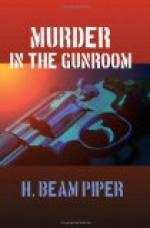“Well, you go over the collection,” Rand told them. “Note down anything you find missing.” He handed them a pad of paper and a pencil from the desk. “I have something else to do, for a few minutes.”
With that he left them scrutinizing the pistols on the wall, and went to the workbench in the corner, drawing the .36 Colt from under his waistband. Working rapidly, he dismounted it, taking off the barrel and cylinder, and cleaned it thoroughly before putting it together again. Pierre and Gresham had just started on the Colts when he slipped the revolver out of sight and rejoined them.
It took over a half-hour to finish; when they had gotten completely around the collection, Rand had a list of twenty-six missing items, including four cased sets. At a conservative estimate, the missing pistols were worth ten to twelve thousand dollars, dealer’s list value; the stuff that had been moved in to replace them might have a value of two or three hundred, but no serious collector would buy any of it at any price. There had been no attempt to replace the cased items; the cases had been merely rearranged on the table to avoid any conspicuous vacancies.
“See that thing?” Pierre asked, tapping a small .25 Webley & Scott automatic with his finger. Rand looked at it; it had been fitted with an English-made silencer. “That thing,” Pierre said, “is the one illustrated in Pollard’s book. The identical pistol; it used to be in the Pollard collection.”
“Lane had a lot of stuff from some famous collections,” Gresham said. “Pollard collection, Sawyer collection, Fred Hines collection, Meeks collection, even the old Mark Field collection, that was sold at Libbie Galleries in 1911. His own could rank with any of them. Think you can get any of this stuff back?”
“I hope so. By the way, where does this fellow Umholtz, the fabricator of spurious Whitneyville Walker Colts, hang out? I believe he ought to be looked into.”
“Say, that’s an idea!” Pierre ejaculated. “He might have bought the pistols, instead of Rivers. Why, he has a gunshop at Kingsville, on Route 22, about fifteen miles west of here, just this side of the village. He had a big sign along the road, and his shop’s in the barn, behind the house.”
“I’ll have to check up on him. But first, I want to see if any of this stuff’s at Rivers’s shop. I won’t ask you to come along,” he told Gresham. “No use you sticking your head into the lion’s mouth. I’ve talked the State Police temporarily off your trail, but I still have Farnsworth to worry about.”
“He’d like to prosecute a big corporation lawyer, if he thought he had any chance of getting a conviction,” Pierre said. “Make a nice impression on the proletarian vote in the south end of the county.”
“You’re a member of the Mohawk Club in New Belfast, aren’t you?” Rand asked Gresham. “Well, go there and stay there for a couple of days, till the heat’s off. Pierre, you can come with me to Rivers’s; I’ll run you home in my car when we’re through.”




